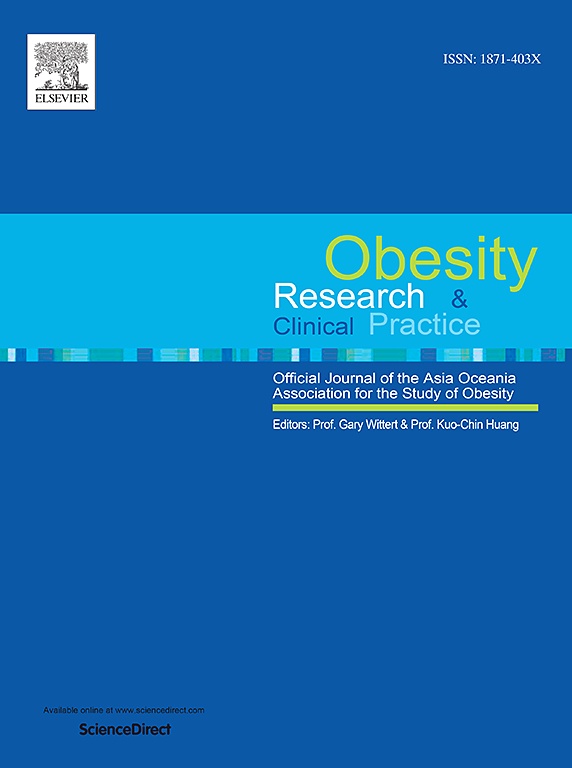肥胖影响血清Klotho与年龄相关性听力损失之间的关系:一项横断面研究。
IF 2.5
4区 医学
Q3 ENDOCRINOLOGY & METABOLISM
引用次数: 0
摘要
目的:肥胖对Klotho与年龄相关性听力损失(age-related hearing loss, ARHL)相互作用的影响有待进一步探讨。本研究在一个大型队列中调查肥胖对血清Klotho水平与ARHL患病率之间相关性的影响。方法:本研究分析了来自全国健康和营养检查调查(NHANES)的3355名参与者的数据。参与者根据体重指数(BMI)分为非肥胖组(BMI < 30 kg/m²)和肥胖组(BMI≥30 kg/m²)。然后,我们使用多变量logistic回归评估血清Klotho水平与ARHL风险之间的相互作用。采用限制性三次样条评价非肥胖组和肥胖组血清Klotho与ARHL之间的剂量-反应关系。结果:在非肥胖参与者中,血清Klotho水平与ARHL的单变量显著相关(OR = 0.84, 95 % CI 0.77-0.93, p )结论:肥胖似乎调节了血清Klotho水平与年龄相关性听力损失之间的关联,为改善听力损伤的预防和管理策略提供了潜在的见解。本文章由计算机程序翻译,如有差异,请以英文原文为准。
Obesity affects the association between Serum Klotho and age-related hearing loss: A cross-sectional study
Objective
The influence of obesity on the interplay between Klotho and age-related hearing loss (ARHL) requires further exploration. This study investigates the impact of obesity on the correlation between Serum Klotho levels and ARHL prevalence in a large cohort.
Methods
The present study analyzed data from the National Health and Nutrition Examination Survey (NHANES) involving 3355 participants. Participants were stratified based on body mass index (BMI) into non-obese (BMI < 30 kg/m²) and obese (BMI ≥ 30 kg/m²) groups. We then assessed the interaction between serum Klotho levels and the risk of ARHL using multivariable logistic regression. Restricted cubic splines were employed to evaluate the dose-response relationship between serum Klotho and ARHL in both non-obese and obese groups.
Results
In non-obese participants, serum Klotho levels were significantly associated with ARHL in both univariate (OR = 0.84, 95 % CI 0.77–0.93, p < 0.001) and multivariable analyses (OR = 0.88, 95 % CI 0.79–0.99, p = 0.034). A restricted cubic spline model confirmed a linear relationship between serum Klotho and ARHL in this group (p for non-linearity = 0.969). Conversely, no significant association was found in obese participants. These findings underscore a persistent association between serum Klotho and ARHL in non-obese individuals after adjusting for confounding factors.
Conclusion
Obesity appears to modulate the association between serum Klotho levels and age-related hearing loss, offering potential insights for improving prevention and management strategies for hearing impairment.
求助全文
通过发布文献求助,成功后即可免费获取论文全文。
去求助
来源期刊

Obesity research & clinical practice
医学-内分泌学与代谢
CiteScore
7.10
自引率
0.00%
发文量
80
审稿时长
49 days
期刊介绍:
The aim of Obesity Research & Clinical Practice (ORCP) is to publish high quality clinical and basic research relating to the epidemiology, mechanism, complications and treatment of obesity and the complication of obesity. Studies relating to the Asia Oceania region are particularly welcome, given the increasing burden of obesity in Asia Pacific, compounded by specific regional population-based and genetic issues, and the devastating personal and economic consequences. The journal aims to expose health care practitioners, clinical researchers, basic scientists, epidemiologists, and public health officials in the region to all areas of obesity research and practice. In addition to original research the ORCP publishes reviews, patient reports, short communications, and letters to the editor (including comments on published papers). The proceedings and abstracts of the Annual Meeting of the Asia Oceania Association for the Study of Obesity is published as a supplement each year.
 求助内容:
求助内容: 应助结果提醒方式:
应助结果提醒方式:


